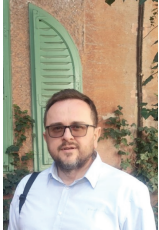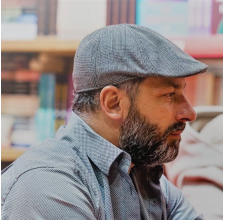Ivan Dodovski (1974) is a Macedonian poet,
fiction writer, and professor of critical theory
and literature at University American College
Skopje. He studied general and comparative
literature with American studies, and he
obtained his MA degree in Macedonian
literature and narratology from Sts. Cyril
and Methodius University in Skopje. He
holds a PhD degree from the University
of Nottingham, UK. His research interests
include identity politics, Balkan imagology,
and contemporary drama. Alongside academic
works, he has authored four poetry books and
a collection of short stories. His poetry and
short stories have been translated into several
languages. He received the first prize for poetry
at the International festival of young writers
Pontes in 1999, in Krk, Croatia.
- We are born in a language, and inevitably emersed in a culture. As children we are shaped by the forces of the language and culture in which we are rased. Then we gradualy come to understand that there are other lands and uncharted sees. Sometimes we fear them, often we desire to explore them. A journey begins. We travel, phisically and spiritually, across new cultures. It is only then that we learn to selfreflect more profoundly. I lived abroad – first in the USA, then in the UK. It is only after this experience that I could understand better my own culture, as well as appeciate the differences within and without. This has cerrtainly affected my litterary work.
- The places in which we have lived and the people with whom we have lived create a spiritual topography to which we inevitably turn time and again. One of those place for me is Bitola, my hometown. It is the place where I first saw the world, and where I spent my childhood and early youth. More importantly, it was in Bitola that I discovered my love for literature. My father was a journalist, he served as a director of the National theatre for a few years, and he also wrote several fiction works himself. Above all, however, for me at least, he was unsurpassed as a reader: he would give up everything for a good book, even in times of economic and social hardship, when the country that we lived in started falling apart. We had a huge private library. Also, cultural life in Bitola was vibrant. Through my father’s contacts and encouragement I had the privellege to meet authors, theatre directors, visual artists and musicians from Macedonia and abroad. I think that all of this – the entire flux of ideas that I was exposed to – was precious for my initial creative quest. Then, I finished my final year of high school in the USA. I lived in a small town in the American South. I saw, contrary to all Hollywood clichés of American glamor and vice, that people there mostly live a simple life, within the general discourse of Protestant morality. It was later on, during my university years in Skopje, that I could critically reflect on the paradoxes of America. For example, I could link my personal experience to the works of William Faulkner, and this has influenced my belief that the great drama of humanity can be discovered even in a small place if the writer has the courage and talent to convey it.
- I have never been to Tirana before. I knew very little about the city before I came. This is the reason why I personally preferred Tirana over other options. This writer residency program was stimulating not only for my own writing, but also as a learning experience. I tried to attend cultural events, meet writers and other artists in a genuine attempt to understand their interests, visions, concerns. I could also explore the urban texture with its mix of the old and modern forms. I noticed the discrepancies between ambitions and tradition, and the nuances of everyday culture which is being produced as we speak. Tirana seems like a web of streets with numerous cafes, bakeries and patisseries, barber shops, small grocery stores, pharmacies and money exchange offices amidst big new buildings, titivated boulevards and daring facades. In a word, this residency was a thrilling experience and I am very thankful for the opportunity to discover Tirana.
- This is the most difficult question. For me it is like asking why the fish swim. My belief is that above all humans are creative beings. Creativity manifests in all forms and activities. To create is to become a person. To be a person means to become a co-author with the Eternal Author. Writing is one of the ways of creative expression, and possibly the most difficult one because it is a quest in the language. We walk in and struggle through the language, trying to express the inexpressible. And all that we discover in this linguistic exile are fragments of truth that can satisfy us insofar as we get a taste of the ultimate act of knowledge pertaining to the Creator. It seems to me that the moments of insight, like good literature, are only possible through a deep, honest, selfless exploration of ourselves through language, through endless pushing of the boundaries of epiphany.




